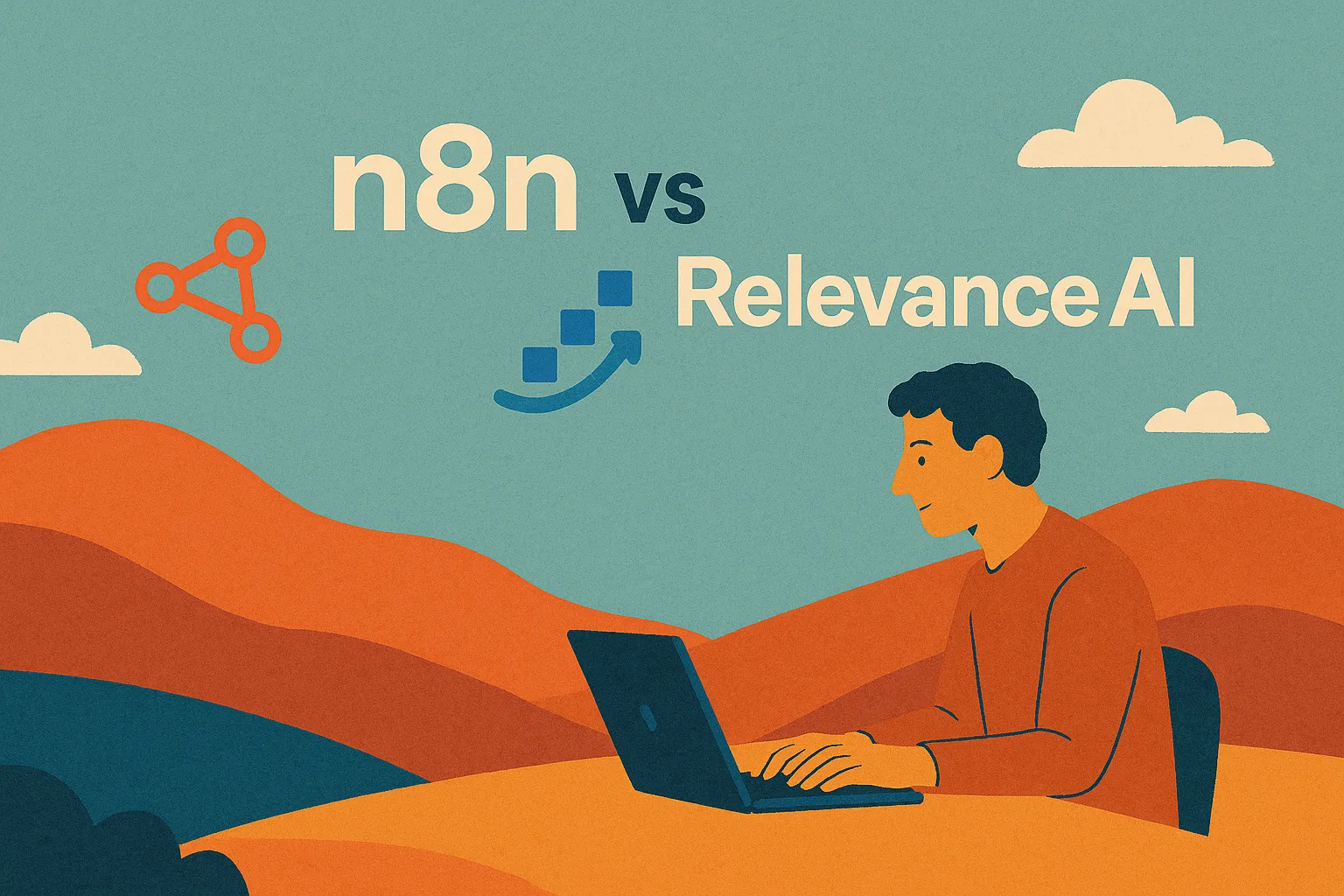
Table of Contents
Introduction
Workflow automation tools have become essential for businesses looking to streamline processes and increase productivity. In this comparison, we'll examine two powerful platforms: n8n and Relevance AI. While n8n is known for its flexible workflow automation capabilities, Relevance AI specializes in AI-powered data processing and application development. Let's explore how these tools compare across various dimensions to help you determine which one best suits your needs.
Key Features Comparison
| Feature | n8n | Relevance AI |
|---|---|---|
| Primary Focus | General workflow automation with visual interface | AI-powered data processing and application building |
| User Interface | Node-based visual workflow builder | Dashboard with visual components and code interfaces |
| AI Capabilities | Integrates with AI services via nodes | Built-in AI features for data processing and analysis |
| Deployment | Self-hosted or cloud-based | Primarily cloud-based with API access |
| Extensibility | Custom nodes, webhooks, and JavaScript code | Python SDK and API integrations |
n8n excels in general workflow automation with its intuitive visual interface and extensive integration options. It allows users to create complex workflows by connecting various nodes representing different services or actions. The platform is highly extensible, enabling users to create custom nodes or use JavaScript code for advanced functionality.
Relevance AI, on the other hand, focuses specifically on AI-powered data processing and application development. It provides built-in capabilities for working with unstructured data, vector databases, and large language models. The platform offers both visual components and code interfaces, making it accessible to users with different technical backgrounds.
Use Cases
n8n Ideal Use Cases:
- General workflow automation across multiple services
- Data synchronization between different platforms
- Scheduled tasks and batch processing
- Custom API integrations and webhooks
- Business process automation with conditional logic
Relevance AI Ideal Use Cases:
- Building AI-powered search and recommendation systems
- Processing and analyzing unstructured data (text, images)
- Creating chatbots and conversational AI applications
- Vector database operations and semantic search
- Developing custom LLM applications with fine-tuning capabilities
While there is some overlap in capabilities, n8n is generally better suited for traditional workflow automation tasks that involve connecting multiple services and executing predefined actions. Relevance AI shines when working with AI-specific tasks, particularly those involving unstructured data and large language models.
Pricing
n8n Pricing:
- Self-hosted (open source): Free with limited features
- Cloud: Starting at $20/month for basic features
- Teams: $40/user/month with advanced features
- Enterprise: Custom pricing with dedicated support
Relevance AI Pricing:
- Free tier: Limited API calls and features for testing
- Growth: Starting at $99/month with increased limits
- Pro: $499/month with advanced AI capabilities
- Enterprise: Custom pricing based on usage requirements
n8n offers more flexibility in terms of deployment options, with the ability to self-host using the open-source version. This can be cost-effective for organizations with existing infrastructure. Relevance AI's pricing is structured around API usage and AI capabilities, which can be more suitable for projects specifically focused on AI applications.
Integration Capabilities
n8n boasts over 200 pre-built integrations with popular services and platforms, allowing users to connect various tools without extensive coding. The platform also supports custom integrations through its HTTP Request nodes and webhook functionality. Additionally, n8n's JavaScript code nodes enable users to write custom logic for complex scenarios.
Relevance AI focuses on AI-specific integrations, particularly with vector databases, LLM providers, and data processing tools. The platform offers a Python SDK that allows developers to integrate Relevance AI's capabilities into their existing applications. While it may have fewer general-purpose integrations compared to n8n, Relevance AI provides deeper functionality for AI-related tasks.
Key Integration Differences:
- n8n excels in breadth of integrations across various services
- Relevance AI offers deeper integration with AI-specific tools
- n8n provides more options for custom integrations through its visual interface
- Relevance AI's Python SDK offers more programmatic flexibility for developers
Conclusion
Choosing between n8n and Relevance AI ultimately depends on your specific needs and use cases:
Choose n8n if:
- You need a general-purpose workflow automation tool
- You want to connect multiple services and applications
- Self-hosting is important for your organization
- You prefer a visual, node-based interface for creating workflows
Choose Relevance AI if:
- Your primary focus is building AI-powered applications
- You work extensively with unstructured data and LLMs
- You need advanced vector search and semantic capabilities
- You prefer a platform specifically designed for AI use cases
For organizations with diverse needs, using both tools in tandem can be a powerful approach. n8n can handle general workflow automation and data movement, while Relevance AI can be employed for specialized AI tasks and applications. This combination leverages the strengths of each platform to create comprehensive automation solutions.
Related Articles
AI Work Portal Team
Experts in workflow automation and AI tools, helping businesses find the right solutions for their needs.